Gress Roots Support
- Details
- Published on Monday, 27 November 2006 17:26
- Written by Alan McGowan
 Joanna's Pool always gives me the creeps. Many, many moons ago, a poor crofter lass called Joanna tried to cross the pool carrying a basket of rushes to mend the roof of her summer shieling on the Lewis moor. Instead, she slipped into the river and drowned.
Joanna's Pool always gives me the creeps. Many, many moons ago, a poor crofter lass called Joanna tried to cross the pool carrying a basket of rushes to mend the roof of her summer shieling on the Lewis moor. Instead, she slipped into the river and drowned.
In more recent times the name of the pool was corrupted to Johnnie's Pool, but if you know the history of the River Gress - on the east coast of the Long Island - then you'll know the pool's tragic past.
Despite its haunted feeling, the pool - in the upper reaches of the seven-mile long Gress - is often floored with sea trout and salmon by September and October. Whenever I fish this dark and brooding resting spot I feel like I'm being watched. Silly really, because all around for as far as the eye can see is just bleak moorland. There's the occasional ruined and lichen-covered remains of stone shielings, and among them probably poor Joanna's humble summer dwelling.
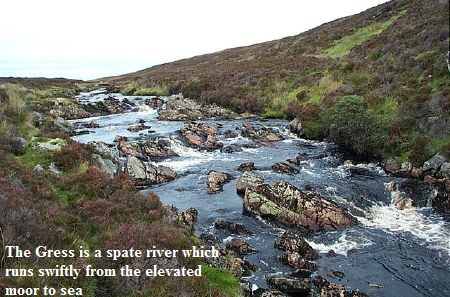 The River Gress gets you like that. It's steeped in history and you just never know who's watching you. The river was once the preserve of the well-heeled Victorian angler. It would take weeks for London-based sporting gents to reach this paradise on trains and steam boats then horse-drawn carriage over unmetalled Hebridean roads. These anglers would eventually decant at Gress Lodge, which still stands overlooking Gress sands out towards the distant mainland sugarloaf mountain of Suilven.
The River Gress gets you like that. It's steeped in history and you just never know who's watching you. The river was once the preserve of the well-heeled Victorian angler. It would take weeks for London-based sporting gents to reach this paradise on trains and steam boats then horse-drawn carriage over unmetalled Hebridean roads. These anglers would eventually decant at Gress Lodge, which still stands overlooking Gress sands out towards the distant mainland sugarloaf mountain of Suilven.
They'd usually stay for months on end, using heavy wooden trout and salmon rods as well as discharging all sorts of guns as they blasted ducks, rabbits and seals to oblivion - such was our Victorian ancestors' bloodlust.
In those days the Gress was almost on a par 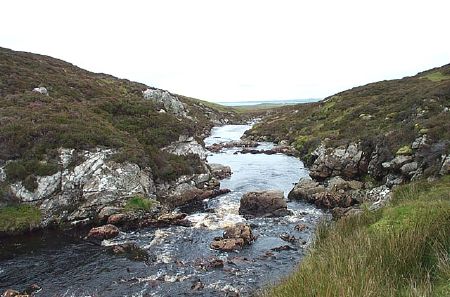 with its near Lewis neighbour Grimersta, which through careful husbandry remains one of Europe's finest salmon systems.
with its near Lewis neighbour Grimersta, which through careful husbandry remains one of Europe's finest salmon systems.
But with the decline of the Victorian angler came the decline in the number of Gress river watchers to keep poachers at bay, along with the decline in the river's maintenance to improve its pools. Eventually this lovely spate river, which drains the vast stretches of moor that make up much of Lewis, became a shadow of its once majestic self. Trawlers with huge sweep nets hoovered up migratory fish in the bay which the river eventually drains into over a golden bar of sand.
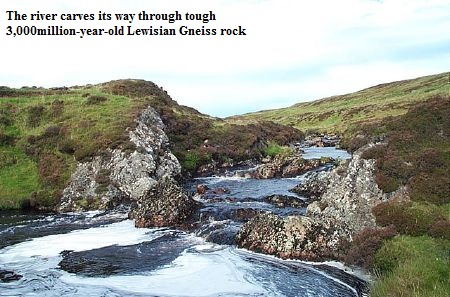 Wholesale poaching with gill nets also took its heavy toll. Along with the national decline in sea trout numbers on the West Coast, the River Gress was fading fast into the history books.
Wholesale poaching with gill nets also took its heavy toll. Along with the national decline in sea trout numbers on the West Coast, the River Gress was fading fast into the history books.
By the 1970s the river was virtually devoid of migratory fish. To catch a sea trout or salmon by then was an incredible feat against man's wanton destruction. The tragic story of Joanna's Pool was destined to be lost altogether. Today, though, there's been a bit of a renaissance.
A local angling club was eventually formed called the Gress Angling Association which secured a lengthy lease of the river from the Stornoway Trust. Its members set about restoring croys, dams and spawning burns. They also gave the river's numerous pools their names back, introduced seasonal angling restrictions, issued affordable permits and encouraged catch return figures.
Nowadays the prospect of catching a sea trout or salmon in the Gress is a distinct possibility and at times almost a certainty for that handful of anglers who know the river really well.
Its peat-stained waters flow swiftly from Loch Gress seven miles from the river mouth high up on the moorland plateau. They slow briefly at a little man made dam where sea trout and salmon often congregate. The river then falls steeply through a series of pools known locally as Bickerdyke's Steps, after the Victorian sporting author John Bickerdyke who once wrote a semi-fictional book about the River Gress called Days In Thule With Rod, Gun And Camera.
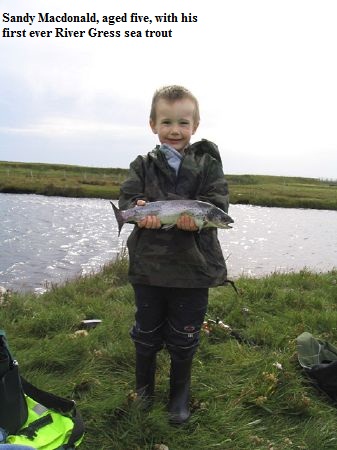 It's here that I lost two salmon last season. They took my little Donegal Blue fly like trout before exploding up and down the pools in a most disconcerting manner.
It's here that I lost two salmon last season. They took my little Donegal Blue fly like trout before exploding up and down the pools in a most disconcerting manner.
Further down, the river opens up into two large pools, held back momentarily by partial dams. A good wind and wave here can often result in a fish or two. I caught a nice sea liced sea trout from the lower of these two large pools a few months ago. I had to kneel while casting because there's no cover on this windswept river and as my flies swung round to the near bank I got a savage take that heralds a fresh sea trout.
The middle section of the river flows at running pace thereafter down a gorge section, through the likes of Foolish Woman's Pool and the Chair Pool, before easing through a series of windings known locally as The Saltings - where high tides wash over the banks and flood the low lying land.
In a big, dirty wave one afternoon I took seven sea trout, the biggest four pounds, all on a size eight Orange Muddler, from one of these sluggish pools on The Saltings. My 10ft trout rod bending and creaking like never before. Just before the river empties into the bay across the beach, there's an old disused road bridge.
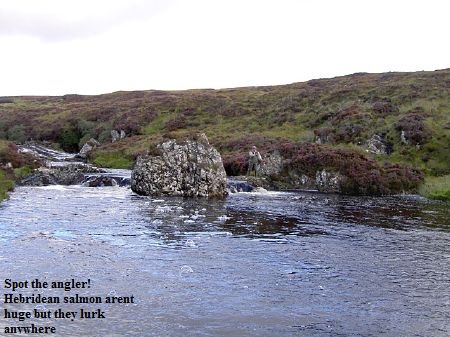 One of my happiest angling memories was standing on that bridge late one summer's evening as the Hebridean sun finally slumped below the horizon. Beside me stood a handful of anglers, young and old, and as the high tide washed into the river under the bridge the peat stained water cleared as it was diluted with sea water. We hung over the railings and watched sea trout, in pods of three and four, cruise quietly into the river, with the occasional salmon also edging upriver.
One of my happiest angling memories was standing on that bridge late one summer's evening as the Hebridean sun finally slumped below the horizon. Beside me stood a handful of anglers, young and old, and as the high tide washed into the river under the bridge the peat stained water cleared as it was diluted with sea water. We hung over the railings and watched sea trout, in pods of three and four, cruise quietly into the river, with the occasional salmon also edging upriver.
We'd all try to catch these very fish throughout the remainder of that season - but just at that moment we watched, wide-eyed and open-mouthed, as the silver flanks of these wonderful fish slipped back into the river of their birth after months, even years, as oceanic wanderers.
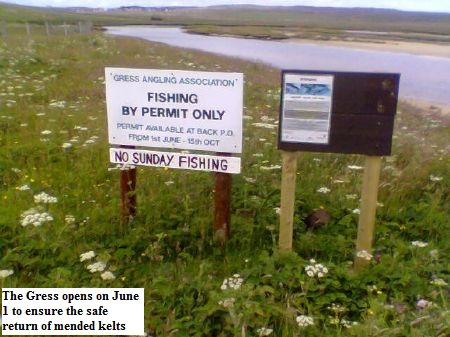 That they're still ascending the River Gress at all is a miracle.
That they're still ascending the River Gress at all is a miracle.
For information on permits visit www.fishhebrides.co.uk/gress

